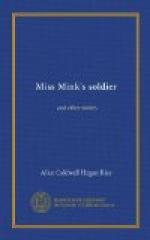On her fourth trip to the main entrance she stopped a train-boy. “Can you tell me where I can get a drink?” she asked, fanning her flushed face. He looked surprised. “Third door to the left,” he answered. Miss Lucinda, carrying a hand-bag, a suit-case, and an umbrella, followed directions. When she pushed open the heavy door she was confronted by a long counter with shining glasses and a smiling bartender. Beating a confused retreat, she fled back to the main entrance, and stood there trembling. For the hundredth time that day she wished she had not come.
The arrangements, so glibly planned by Floss, had not been adhered to in any particular. At the last moment that mercurial young person had decided to go on two days in advance and visit a friend in Philadelphia. She wrote Miss Lucinda to come on to Chicago, where Tom would meet her and give her her ticket, and that she would meet her in New York.
With many misgivings and grievous twinges of conscience, Miss Lucinda had bade Miss Joe Hill a guilty farewell, and started ostensibly for her brother’s home. At the Junction she changed cars for Chicago, missed two connections, and lost her lunch-box. Now that she had arrived In Chicago, three hours late, nervous and excited over her experiences, there was no one to meet her.
A sense of homesickness rushed over her, and she decided to return to Locustwood. It was the same motive that might prompt a newly hatched chicken, embarrassed by its sudden liberty, to return to its shell. Just as she was going in search of a time-table, a round-faced young man came up.
“Miss Perkins?” he asked, and when she nodded, he went on: “Been looking for you for half an hour. Sis told me what you looked like, but I couldn’t find you.” He failed to observe that Floss’s comparison had been a squirrel.
“Isn’t it nearly time to start?” asked Miss Lucinda, nervously.
“Just five minutes; but I want to explain something to you first.” He looked through the papers in his pocket and selected one. “This is a pass,” he explained; “the governor can get them over this road. I got there late, so I could only get one that had been made out for somebody else and not been used. It’s all right, you know; you won’t have a bit of trouble.”
Miss Lucinda took the bit of paper, put on her glasses, and read, “Mrs. Lura Doring.”
“Yes,” said Tom; “that’s the lady it was made out for. Nine chances out of ten they won’t mention it; but if anything comes up, you just say yes, you are Mrs. Doring, and it will be all right.”
“But,” protested Miss Lucinda, ready to weep, “I cannot tell a falsehood.”
“I don’t think you’ll have to,” said Tom, somewhat impatiently; “but if you deny it, you’ll get us both into no end of a scrape. Hello! there’s the call for your train. I’ll bring your bag.”




